
The illustration was created by the author on FLUX.1 from Black Forest Labs through detailed prompting without modifications.
Gemini 2.5 model from Google DeepMind has overcome a difficult practical task, which human programmers could not manage, becoming the first AI model to obtain a gold medal at an international programming competition in Azerbaijan this month.
Delo.ua reports on this, citing material from The Guardian.
Google DeepMind equated this event to the victory of the Deep Blue computer over Garry Kasparov in chess in 1997 and the AI’s triumph over the world Go champion in 2016.
During the competition, the model was able to compute an endless number of variants in less than half an hour to direct fluid through a pipe system to multiple interconnected tanks, and to accomplish this as quickly as possible. None of the human teams, not even the strongest contestants from universities in China and Japan, were able to cope with the challenge.
The AI failed in 2 out of 12 tasks, but overall took second place among the 139 best student programmers worldwide. Google called it “ a landmark moment on the road to AGI (artificial general intelligence) . “
“ In my opinion, this moment is equivalent to Deep Blue in chess and AlphaGo in Go. And even more so, because we are talking about real-world problems, not just confined environments like games. That’s why I believe this breakthrough is capable of transforming many scientific and engineering fields , “ said Kwok Le, vice president of Google DeepMind, specifically noting the creation of medications and microchips.
The model possesses versatile capabilities, but it was explicitly trained for exceptionally intricate coding, mathematical, and logical assignments. According to Google, it performed at the level of “ a top 20 programmer globally . “
The company stated: “ Solving intricate problems in such contests demands profound abstract thought, inventiveness, the capacity to synthesize novel solutions for problems never encountered before, and a truly outstanding mind . “
Not all specialists share the enthusiasm. Professor Stuart Russell (University of California, Berkeley) noted that “ claims of epoch-making significance seem overblown . “ In his view, Deep Blue’s victory in chess had “ zero influence on the applied domain of AI , “ although success at the ICPC ( International Student Programming Olympiad ) carries weight, as the code had to genuinely function in trials.
Michael Wooldridge, a professor at Oxford University, characterized the achievement as impressive but questioned the extent of computational resources required. Google has only verified that it greatly exceeds the capabilities of the average user subscribed to the Google AI Ultra service for $250 per month.
ICPC Director Dr. Bill Poucher stated: “ Gemini’s triumph at this level marks a crucial juncture in defining the benchmarks and instruments for the upcoming generation of AI . “

The illustration was created by the author on FLUX.1 from Black Forest Labs through detailed prompting without modifications.
Four significant breakthroughs in machine intelligence
1957 — Perceptron
Frank Rosenblatt (Cornell University) developed the theory of a “ perceiving and recognizing machine “ and named it a perceptron. The apparatus could learn to discern patterns in visual, electrical, or auditory data, akin to the human brain. In 1958, he constructed a room-sized device—one of the initial advancements in the realm of neural networks.
1997 — Deep Blue
In May 1997, IBM’s Deep Blue became the first computer to triumph over the then-reigning world champion Garry Kasparov in standard chess. This represented a pivotal point in the advancement of computing capabilities, although the competition was intense.
2016 — AlphaGo
The AI firm DeepMind (Demis Hassabis) conceived AlphaGo, which bested South Korean champion Lee Sedol 4-1 in the famously intricate game of Go. Certain moves by AlphaGo, including the renowned “ move 37 , “ were regarded as indicators of genuine creative thought.
2020 — AlphaFold
Another innovation from DeepMind was the AlphaFold program, which mastered predicting the 3D configurations of proteins. This aided in comprehending vital biological mechanisms and ultimately garnered Demis Hassabis and John Jumper the Nobel Prize in Chemistry in 2024.






